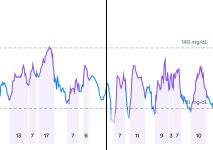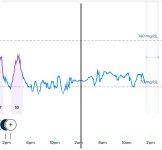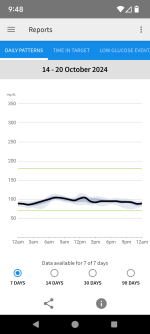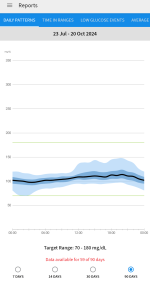You are using an out of date browser. It may not display this or other websites correctly.
You should upgrade or use an alternative browser.
You should upgrade or use an alternative browser.
Continuous Glucose Monitors (CGMs)
- Thread starter Dee X
- Start date
I felt like death one morning and decided to check my sugar (randomly have a test kit at home). Popped up with <30 😵💫, and I'm not a diabetic. Got myself a CGM prescription right after for a Libre 3 and have been loving it. What really sucks is the app.
It's been cool seeing how my glucose is affected each time I consume something. Same with when I have lack of sleep and "get my second wind". Most interesting one was seeing a huge spike when driving in treacherous conditions for a long period of time... apparently that makes your body release glucose.
It's been cool seeing how my glucose is affected each time I consume something. Same with when I have lack of sleep and "get my second wind". Most interesting one was seeing a huge spike when driving in treacherous conditions for a long period of time... apparently that makes your body release glucose.
I wear one, Freestyle Libre 2, which is not the best out there but good enough IMO.
I think it really depends on what your diagnoses are, what other meds you take and your GLP-1 dose.
If you are T1D or T2D and need insulin, a CGM is a no brainer.
If you are taking a high dose (10mg +) or have tried a standard finger prick test a few times and consistently get low readings, then I'd consider one.
I'm prediabetic, my A1C was 5.7 before starting tirz. I take a low dose of metformin (500mg extended release) a day, and my dr wanted me to keep taking that, in addition to tirz.
I have a finger prick blood glucose meter and honestly, I think that's more than enough. I used to track my fasting BG daily, or at least before the shot and 1-2 days after. It's easy to check your BG this way If you suspect a low BG and eat something. You really don't need a CGM to tell you that, feels like an overkill.
Now, let me tell you why I went back to the CGM this month. I have insomnia: I can fall asleep without any issues, but most days I wake up in the middle of the night (anything from 2:30 to 4:30-5:00) and can't go back to sleep, no matter what I do. Normal sleep aids don't help me at all. So I suspected that I might have low BG during the night and that was triggering a cortisol spike and waking me up. So I went ahead and put my CGM back to see what's going on. I'm at a low dose (2.5mg) so I wasn't really thinking it was a hypo event, but.. you never know. I can see that my bg consistently decreases for 1-2 days after the shot. The lowest is 82. I did have a few 70s but seemed more random. So no, I'm not waking up due to hypo events. Maybe you are! So it's not a bad thing to verify if this is your case.
So my two cents: check with a finger prick a couple times. If you really do see a pattern of hypo, then ask your dr for a prescription. Unless you are T1D/T2D, insurance might not cover you. You can use GoodRx for a discount anyway. I paid $82 a few weeks ago for 2 sensors (1 month) without insurance, just the other discount.
Side note: I agree with @Dee X that is cool to see how your glucose fluctuates. I think it's an overkill to try to tweak carb load, the order of meals, etc based on this, since GLPs really do the heavy lifting for you. But it's fun to see anyway. You get to learn how your body reacts to certain foods, exercise, etc. I did a few experiments before using Tirz and it was illuminating. Back then, it also helped me prove to my endocrinologist that I had insulin resistance.
I think it really depends on what your diagnoses are, what other meds you take and your GLP-1 dose.
If you are T1D or T2D and need insulin, a CGM is a no brainer.
If you are taking a high dose (10mg +) or have tried a standard finger prick test a few times and consistently get low readings, then I'd consider one.
I'm prediabetic, my A1C was 5.7 before starting tirz. I take a low dose of metformin (500mg extended release) a day, and my dr wanted me to keep taking that, in addition to tirz.
I have a finger prick blood glucose meter and honestly, I think that's more than enough. I used to track my fasting BG daily, or at least before the shot and 1-2 days after. It's easy to check your BG this way If you suspect a low BG and eat something. You really don't need a CGM to tell you that, feels like an overkill.
Now, let me tell you why I went back to the CGM this month. I have insomnia: I can fall asleep without any issues, but most days I wake up in the middle of the night (anything from 2:30 to 4:30-5:00) and can't go back to sleep, no matter what I do. Normal sleep aids don't help me at all. So I suspected that I might have low BG during the night and that was triggering a cortisol spike and waking me up. So I went ahead and put my CGM back to see what's going on. I'm at a low dose (2.5mg) so I wasn't really thinking it was a hypo event, but.. you never know. I can see that my bg consistently decreases for 1-2 days after the shot. The lowest is 82. I did have a few 70s but seemed more random. So no, I'm not waking up due to hypo events. Maybe you are! So it's not a bad thing to verify if this is your case.
So my two cents: check with a finger prick a couple times. If you really do see a pattern of hypo, then ask your dr for a prescription. Unless you are T1D/T2D, insurance might not cover you. You can use GoodRx for a discount anyway. I paid $82 a few weeks ago for 2 sensors (1 month) without insurance, just the other discount.
Side note: I agree with @Dee X that is cool to see how your glucose fluctuates. I think it's an overkill to try to tweak carb load, the order of meals, etc based on this, since GLPs really do the heavy lifting for you. But it's fun to see anyway. You get to learn how your body reacts to certain foods, exercise, etc. I did a few experiments before using Tirz and it was illuminating. Back then, it also helped me prove to my endocrinologist that I had insulin resistance.
My daughter has type 1 diabetes. When she was diagnosed myself and my husband went ahead and got an over the counter Lingo cgm to put on with her in solidarity since she was sad about having to wear one. The crazy thing is I also started Tirzepatide that week.
Before I started the Tizepatide my blood sugar was swinging wildly up and down all day long and I was always hungry and didn't understand why. After taking the first tirzepatide dose my blood sugar stopped swinging wildly and now I'm only hungry at appropriate times. The actual visibile results made my inner geek so happy! I haven't noticed any scary lows but my blood sugar does consistently stay much lower on the tirz. *edited to add that when my daughters blood sugar falls she gets hungry. So it makes so much sense why I was hungry all of the time before the meds! I also used the dexcom stelo and felt like it wasn't as accurate as the lingo has been compared to random finger stick checks.


Before I started the Tizepatide my blood sugar was swinging wildly up and down all day long and I was always hungry and didn't understand why. After taking the first tirzepatide dose my blood sugar stopped swinging wildly and now I'm only hungry at appropriate times. The actual visibile results made my inner geek so happy! I haven't noticed any scary lows but my blood sugar does consistently stay much lower on the tirz. *edited to add that when my daughters blood sugar falls she gets hungry. So it makes so much sense why I was hungry all of the time before the meds! I also used the dexcom stelo and felt like it wasn't as accurate as the lingo has been compared to random finger stick checks.


This is super cool. It's exactly what I'm seeing in mine too. No more spikes or up/down swings. A few small "hills" for sure. I'm also eating way less and very low carb anyway, so that absolutely helps. But for data nerds (I'm one of those too!) it's cool to see how it looks 😆Before I started the Tizepatide my blood sugar was swinging wildly up and down all day long and I was always hungry and didn't understand why. After taking the first tirzepatide dose my blood sugar stopped swinging wildly and now I'm only hungry at appropriate times.
BTW great thought to also get a CGM yourself to help your kiddo!
I wish Abbott's apps would be less ass, but being able to export the data in a CSV is nice. All the graphs!This is super cool. It's exactly what I'm seeing in mine too. No more spikes or up/down swings. A few small "hills" for sure. I'm also eating way less and very low carb anyway, so that absolutely helps. But for data nerds (I'm one of those too!) it's cool to see how it looks 😆
BTW great thought to also get a CGM yourself to help your kiddo!
jestintime
GLP-1 Novice
I’m not diabetic or prediabetic, but I did have one fasting glucose test come back just over 100, which freaked me out. So, when the Dexcom Stelo kit (with two sensors) was released around the same time, I jumped on one. I wore the first sensor while waiting for my first GLP1 prescription (compounded semaglutide) to arrive, and have been saving the second sensor to wait until I’m titrated up and can see the difference in my glucose patterns.
My experience with the first sensor was interesting, especially in terms of illuminating how significant meal timing was for me. Carbohydrates consumed later in the day caused much larger and longer-lasting spikes compared to earlier in the day. This information made it easier for me to make good food choices, as I could now see concrete evidence of how my body responded to different foods and eating habits.
Fortunately, I haven’t had any hypoglycemic events since starting semaglutide. If I had to guess, I’m assuming the difference in my glucose levels post-semaglutide will be similar to what @Hopeslost mentioned above.
I’m tentatively planning to wear the second sensor sometime next month. I’m excited to get the next batch of data and do some comparisons.
My experience with the first sensor was interesting, especially in terms of illuminating how significant meal timing was for me. Carbohydrates consumed later in the day caused much larger and longer-lasting spikes compared to earlier in the day. This information made it easier for me to make good food choices, as I could now see concrete evidence of how my body responded to different foods and eating habits.
Fortunately, I haven’t had any hypoglycemic events since starting semaglutide. If I had to guess, I’m assuming the difference in my glucose levels post-semaglutide will be similar to what @Hopeslost mentioned above.
I’m tentatively planning to wear the second sensor sometime next month. I’m excited to get the next batch of data and do some comparisons.
nurseratchit
GLP-1 Specialist
Unless you are T1 or T2D who is on insulin, hypoglycemia is not too concerning. You will feel crappy but your liver will save you from dangerous lows by pumping out more glycogen. However, people can learn about they react to different foods by wearing a CGM for a while. They can be a great learning tool providing immediate feedback for those trying to change their eating habits.
My CGM numbers have always run ~15 mg/dL higher than finger pricks (for the past 60 days that I've been using them).The libre 2 app truly sucks. When you get the csv with the data dump you can see better, but you need to make all the visuals yourself.
BTW, this is what my week looks like. Metformin 500mg ER + tirz 2.5. a bit less than 1000 calories daily, no exercise. It's... A flatline 🤣
View attachment 2974
Attachments
Jailbreak7
GLP-1 Enthusiast
Dexcom G7... have tried (for fun) Dexcom Stelo, Abbott's Lingo, as well as Sibionics GS1... they all worked great but sticking with the G7 (since my insurance covers it)Given that GLP1s increase the chances of hypoglycemia, who here uses CGMs and which ones?
raw_oyster_eater
lemon bottle brewer
300 bucks a month. i'd rather spend that on shit i can inject.
Jailbreak7
GLP-1 Enthusiast
nah.. they are $89 a month (subscription) or $99 if doing an one-time purchase.. but still..300 bucks a month. i'd rather spend that on shit i can inject.
raw_oyster_eater
lemon bottle brewer
1200 bucks a year? i'd rather spend that on shit i can inject.nah.. they are $89 a month (subscription) or $99 if doing an one-time purchase.. but still..
Insurance covers them for a lot of people, even if just for weightloss.1200 bucks a year? i'd rather spend that on shit i can inject.
Trending Topics
Members Online
- Rinat
- glp_man
- woundcarping
- swanky_butcher
- indolent
- lessthanhalf
- cheaperseeker
- New2ton
- Glenn
- biojinx
- DaveFromIT
- marriage7533
- Amino Lair
- Juliana
- Frankie_77
- Nart19
- Monte2024
- kaenftoper
- Vega805
- nbs05002
- m100568
- Peptide Bandit
- JCPro
- Nextlevel
- Saltylizard13
- hopeful2
- Ascender
- BlazinRage
- RadicalCrimson
- rabbitholedeath29
- Hunt17293&
- LeesaEm
- westicles
- joseblo
- kesda
- Kristyg10
- Venlsd25
- niberrios
- Canuck54321
- FRMN01
- fatdude
- KBR (Wayne)
- Lbstickz23
- onmyass60
- Savvyyky
- Labcat
- Leshug
Total: 451 (49 Members & 402 Guests)


